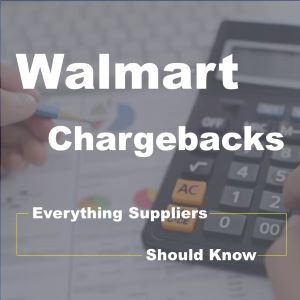Retail supplier accounting departments are researching deductions every month when their profit and loss statements come out. Deductions occur when a retailer refuses to pay for a portion of what was billed to them (due to damaged freight, short shipment, clerical errors, wrong merchandise, etc.).
If the supplier feels the retailer is incorrect for requesting a deduction, the supplier can dispute. The method for keeping track of such claims and ensuring payments are collected or corrected falls under the supplier’s deduction management process.
What Is Deduction Management?
Deduction management (sometimes called claims management) is the organization, validation or rejection, and resolution of deductions submitted to a supplier by a retailer. If the retailer feels they should not have to pay the full amount of the bill, they may deduct, or short pay, the amount they feel is owed to them.
Types of Deductions
Part of managing deductions at the end of the billing cycle is determining the nature of the deduction. This can fall into two categories:
- Claims Deductions: A claims deduction happens when part of the payment billed by a supplier is deducted by the retailer. The retailer refuses to pay the full amount of the bill. As described above, this happens when the retailer received damaged goods, a short order, incorrect merchandise, or another reason that may generate a dispute.
- Earned Deductions: An earned deduction happens when a supplier gives the retailer a discount for their purchase based upon agreed conditions. For example, a supplier may agree to give a retailer a 15% discount for ordering large amounts of product in a set period of time. The earned deduction is just a regular part of the business based on the selling agreement. For the accounting department, it is still important to track and manage these deductions.
How Deductions Are Resolved
Once a supplier is informed that a retailer has issued a deduction, the management process starts. In order to resolve a deduction and make any possible corrections to the profit and loss record, here are the steps to follow:
1. Communicate Deduction Upon Receipt
As soon as the deduction comes in, the person receiving claims should inform the analyst or person responsible for research and resolution immediately. Resolving deductions eligible for dispute can take time to research, so time is important.
2. Sort Deductions by Priority
Prioritizing deductions is essential, especially when selling and delivering to multiple retailers. Factors to consider are how much in loss the deduction means to the supplier’s bottom line, the amount of research that will go into the dispute, and if the dispute must be issued in a certain window of time.
3. Collect Documentation
Once the deduction has been submitted and prioritized, a retail analyst usually collects information to challenge, or dispute, the deduction. This begins with contacting the person who created the original invoice for the order in question. This will also help in quickly identifying all people, processes, and systems that could have impacted the order.
After this base information is collected, the analyst requests and examines any documentation associated with the original invoice. This may include Proof of Delivery, Bill of Lading, order invoice, sales invoice, tax receipt, and other documents related to the order.
4. Match Documents to Resolve Deduction Claim
With all the documentation collected, the analyst now goes through each piece of information to match different records with the deduction, or claims document. The goal is to find the error to validate the deduction or match all information to dispute the deduction with the retailer.
5. Communicate Back to the Retailer
If the research done on the deduction shows that the claim is legitimate, it is time to follow up with the retailer. Depending on the agreement with the retailer, a reimbursement or credit may be initiated.
In other cases, the analyst may prove that the deduction claim is invalid. Whether manually or through a system dispute portal, the supplier now takes steps to dispute the deduction with required documentation for the retailer.
How Suppliers Can Reduce Deductions
While there is no one blanket answer for reducing all deductions, the root cause is usually some broken link in the supply chain. Each deduction can be traced back between the creation of a purchase order to the fulfillment at a warehouse or store.
A few best practices to help improve supply chain accuracy include:
- Checking the purchase order for correct cost and allowances before filing the order.
- Verifying all EDI data and purchase order information to ensure what is being delivered matches the terms in the agreement with the retailer.
- Reviewing item specifications for allowance, unit, and weight information.
- Resolving all purchase order, labeling, and packaging issues prior to shipping.
The issue most suppliers face is simply time. Small and mid-sized suppliers may not have the time or resources to dispute deductions issued by big box retailers like Walmart, Target, and Costco.
Whether the deductions continually relate to clerical errors, labeling, or poorly packed freight, a little investment in third-party help can save suppliers hundreds of thousands of dollars each year.
8th & Walton assists Walmart suppliers in researching, disputing, and reducing deductions. Through live online Walmart deduction classes or with specialized one-on-one help, reducing deductions is achievable when focusing on a supplier’s specific issues case-by-case.
Deduction Management at Walmart
Suppliers doing business with Walmart may experience a variety of deductions, fines, and monetary penalties. Why suppliers receive various deductions is specified in deduction codes assigned to each penalty.
The question suppliers ask in each instance is usually “Is this deduction disputable?” The answer depends on the nature of the penalty.
While many deductions can be disputed with Walmart, penalties related directly to the On-Time In-Full (OTIF) initiative are usually final with exceptions being rare. Refer to the deduction code provided by Walmart in each instance to verify the deduction can be challenged.
Conclusion
Deduction management is a vital part of every supplier’s accounting process. Lowering and eliminating the unnecessary deductions puts dollars back on the bottom line and works to improve the overall supply chain.
Finding the root cause of constant deductions may require a fresh look from an experienced team of Walmart accounting experts. For a free consultation about your deduction and supply chain process, contact 8th & Walton this week.



